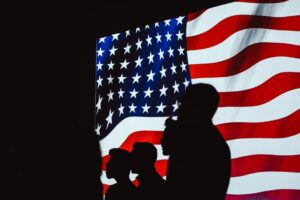
The Second Amendment debate is wrapped around the axles a reinterpretative legalism and history revisionism, with both sides claiming absolutely that the framers of the Bill of Rights meant precisely what they mean. Getting lost in this word salad thicket of contradiction and wishful thinking sidesteps the deeper truth, a truth which is more sublime than the Second Amendment and which questions the entire basis of the Westphalian order of the nation-state as the prime mover in human civilization.
Let us assume we must craft a legal standard akin to the Bill of Rights which is considered so inviolate that even attempting to pass a law or policy against its standard of justice is considered at least a misdemeanor worthy of permanent disqualification from holding public office or even holding the voting franchise.
To what authority or standards of reason, logic, or justice do we appeal? Ultimately, we are forced to make a priori assumptions amenable to most everyone. As even the Declaration of Independence says, “we hold these truths to be self-evident that all men (*they meant all HUMANS) are created equal” and that they are endowed by their Creator (whether you calls that Creator God or natural evolution) with certain “inalienable rights”, among which “life, liberty, and the pursuit of happiness.”
This is all a priori assumption. Our 21st century declaration of independence might begin thus:
“We hold these truths to be self-evident that in advancing the cause of a free and pluralistic society, which is our natural human state as ordered by the Universe, all human beings are created and deemed by law and custom to be equal in value, worth, dignity, and right and that they are inherently endowed with inalienable rights including life, liberty, self-determination, self-preservation, self-expression, and freewill participation through mutual agreement along with the inherent sovereign power to protect their sacred rights, persons, and property from hazards and harms, official or unofficial, foreign or domestic.”
We would further add that each individual elector owns a right to freely participate in the powers of petition, election, initiative, redress, and recall and to have and form their own families, extended families, free associations, communities of trust within a fraternal bond, and national communities as autompmous sociocultural and socioeconomic core constituent entities within our diverse and pluralistic commonwealth.
Again, these are a priori assumptions one either believes or does not believe. But the problem here is that if one believes these assumptions are true then believing thus does no harm to those who disagree, unless the freedom of others grieves them, while those who disagree and wish to deny such freedom must necessarily coerce the Freedomist into compliance.
The Freedomist imagines a world of diverse sociocultural and socioeconomic structures and communities, expressing nationhood in diverse ways but within a common standard of a sort of meta-nationhood based on a Freedomist standard of justice and peace. The anti-freedomist sees a world of much more narrow restrictions because they don’t really trust the freewill choices of others. They can easily disregard these so-called rights, except perhaps in a most narrow, restrictive interpretation.
President Biden’s assault on the Second Amendment, while also factually wrong in its claims gun control and restrictions on weapons were present “from the beginning”, is a radical anti-freedomist. His interpretation and understanding of the Second Amendment makes a hash of the basic right to self-preservation.
The Bidens of this world have a normative view of society: they imagine something in theory and assume they can use the law and public policy to make it so. Freedomists tend toward a more descriptive view of society based on nature, human nature, and the laws of cause and effect and then seek policies that contribute the most to the individual and common good and that reflect this framework of reality.
The right to self-preservation is an a priori assumption. You either think each person and then their primary communities of trust is the prime mover of human civilization therefore owns a right to self-preservation or you do not.
But were we to assume that this right exists and were we not using the legalism of the Second Amendment debate to frame it, but only our a priori assumption, what would our concept of an inherent right to self-preservation look like?
We will make the assumption, which seems logical and fits with human nature as it is, that as self-preservation cannot solely be achieved as a lone individual against any save a few other people, it stands to reason this right is, uniquely among any others, a corporate/collective right that is shared among a body of people. Again, it no more matters to us the ideological or legalistic intent of the framers of the Bill of Rights than it mattered to them how the framers of the English Constitution intended their (unwritten) provisions.
We often say we defend liberty as defined by the original spirit and intent of the US Bill of Rights, and as to the Second Amendment, the spirit and intent is deeper than the legalistic interpretation according to the Courts.
We claim that the right to self-preservation is in fact an inherent right owned by the electors in any given commomwealth and this right applies to the individual, their primary community of trust, and the other constituent entities of the commonwealth. Moreover, we claim, regardless of the legal reading and interpretation, that this understanding is far more consistent with the original spirit and intent of than the way Biden interprets it.
The practice of this right can occur at the individual level, but, we propose, as it is also a shared right, its implementation necessarily differs based on the scale of its practice. Basically this means how one practices this right, even what weapons one may access or prerequisite for their use, might differ. Those who argue whether this is alone an individual right or a alone a collective right, miss the spirit and intent of the right to self-preservation, which is all of these things at once.
The inherent right to self-preservation also runs up against a novel of the Westphalian nation-state concept. This novelty is predicated on the notions that the state is the prime mover in human civilization, that nationhood is best expressed and preserved in the form of a national state, and, therefore, that this state is the primary bearer of arms and owns a monopoly of force beyond the limited individual right to self-preservation.
The Peace of Westphalia of 1648 set this course and never has the idealistic promise of an international order of such nation-states been achieved. To be sure, if all national peoples who were large enough to be able to sustain themselves, and if different smaller nations of people formed confederal unions for mutual support, we might have a world of over 1000 nation-states or national comfederal unions, and that might be ideal.
But in the 21st century we have multiple ways to express sovereignty and to form sociocultural and socioeconomic bonds with people from around the world. The very scope of nationhood and sovereignty goes well beyond the old limits of geography, ancestry, distance we can travel, and ease with which larger associations can be formed.
We often call ourselves “nationists” instead of “nationalists”, because our concept and practices of nationhood transcend this 17th century civilizational paradigm, the Westphalian nation-state. A nationist believes every national people have a right to self-preservation and includes within the scope of alternative forms of sovereignty, such an enhanced NGO, fraternal benefit societies, domestic fraternal nations, and tribal entities, among other structures.
The idea that the “state” has a “monopoly of force” is inconsistent with either an individual or a shared right to self-preservation. While it is understandable that the scope of the means of self-preservation may vary between individuals, local communities, free associations, and the state and its subdivisions, in general, we hold that the right to self-preservation is inviolate.
We will not delve too far into our conception of this distributed magisterial and imperial mandate, which basically means that the state cannot ever be considered to hold a monopoly in such matters, beyond saying, for instance, a “tribal” structure like a society would not have nuclear missiles, but it (along with community constabulary companies) would likely have anything equivalent to a light infantry regiment, and an individual may have more limitations still, especially if they are not part of a local constabulary company.
Again, setting aside the argument as to the legal definition and meaning of the Second Amendment, which we see as an individual AND a shared right, we see the right to self-preservation as something that includes a responsibility. In essence, access to certain means of self-preservation may require some form of participation in local or other forms of mutual self-preservation, e.g. a local constabulary company (like the militia of colonial America but not like the private militia groups of our day).
We then move on to a ticklish issue: who has a right to keep and bear arms? In general, again, setting aside the present legal structures and laws, we tend to see a separation between mere citizenship and electorship. Electors are stakeholders who earn their status through merit alone, everyone is free to become an elector regardless of race or gender, so long as they adhere to and uphold the country’s charter and something like the Bill of Rights.
The ability to determine who meets this requirement is critical to the preservation of a country and its constituent nations of people. The abuse of this concept, for the purpose of preventing blacks in the south to vote, is morally repugnant. But this racism is most definitely NOT part of this idea: electorship should be earned, not assumed by birth or residency, and it should both be open to all and access to the means of gaining qualifications for electorship should be freely available to all without cost.
The concept of electorship is not part of the present American system and nor will that ever likely change. But the concept of electorship informs our view of self-preservation. The state does not own a monopoly on force, we strongly oppose that archaic notion! But the body of people, in the form of their diverse national societies (societies based on a nationality) and local communities, as well as the state and its constituent entities, as stakeholders, do own a monopoly on force.
In practical terms this means that while citizens own a right to self-preservation at a basic level, they do not have the same level of access to the means of self-preservation as the electors and their corporate bodies or the state.
Again, we are talking theory here, not prescribing policies or laws for America. What we are saying is that the right to self-preservation transcends the Bill of Rights and is both individual and corporate and includes, we think, the right for local communities in an egalitarian constabulary and of private societies based on shared nationhood, to share the monopoly of force with the state.
The workarounds for this may be forming local community policing initiatives which transform the hired police into a mostly voluntary constabulary force, the use of private security cooperatives, efforts to lobbh states to create local state-funded civil defense groups, and a robust defense of the Second Amendment.
As to this concept of electorship, it seems a good idea this country will never adopt, but it does explain our stance on self-preservation as an individual and shared right that comes with responsibilities.
As with most Freedomist ideas, our approach here is mostly on things we can do within existing frameworks to actualize our ideas and convictions. Private efforts like outdoors, hunting, and fishing clubs and security cooperatives coupled with promoting Freedom Sanctuaries and reforming local policing (community policing through a citizen’s constabulary) do not require a change in federal laws or the Constitution can fulfill in spirit this concept of self-preservation.










